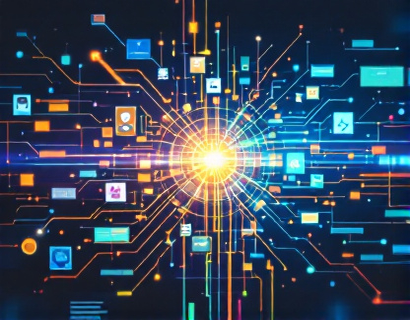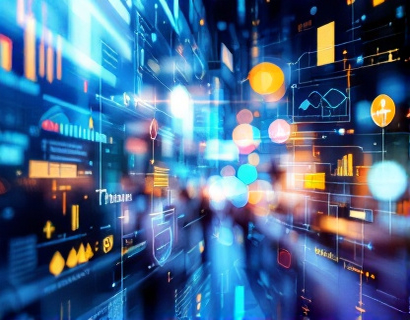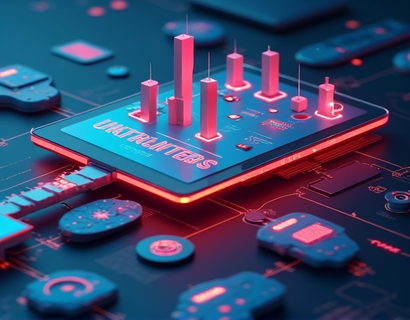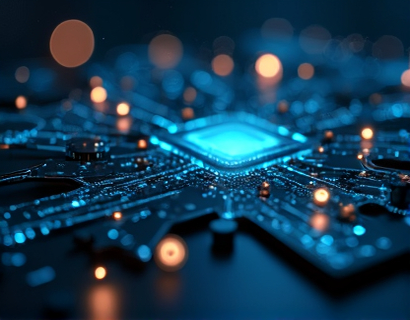AI and Crypto: Pioneering Enhanced Digital Experiences with Next-Gen Ucosystem Solutions
The intersection of artificial intelligence (AI) and cryptocurrency is giving rise to a new era of digital interactions, one that promises to redefine how we engage with technology and manage our financial lives. This fusion of technologies is not just a novel concept but a transformative force that is already reshaping the landscape of digital experiences. The integration of AI with blockchain and cryptocurrency is creating innovative applications that enhance user engagement, security, and financial empowerment. This article delves into the profound impact of this merging, exploring how these technologies are collaborating to offer a new paradigm in digital solutions.
The foundation of this transformation lies in the unique properties of cryptocurrency, which include decentralization, transparency, and security. When combined with the advanced capabilities of AI, such as machine learning and natural language processing, the potential for innovative applications becomes vast. AI can analyze vast amounts of data from blockchain transactions, providing insights that can optimize financial decisions, enhance security measures, and personalize user experiences. This synergy is not only improving existing services but also paving the way for entirely new categories of applications.
Enhanced Financial Empowerment
One of the most significant benefits of the AI and crypto convergence is the enhancement of financial empowerment for individuals. Traditional financial systems often exclude a large portion of the global population due to high costs, complex regulations, and limited access. Cryptocurrency, with its decentralized nature, offers a more inclusive alternative. AI enhances this by providing tools that make cryptocurrency more accessible and user-friendly.
For instance, AI-driven wallets can automatically manage and optimize cryptocurrency holdings, suggesting the best times to buy or sell based on market trends and user behavior. These wallets can also integrate with traditional banking systems, allowing seamless conversion between fiat and crypto, thus bridging the gap between the two worlds. Furthermore, AI can help in creating more robust identity verification systems, reducing the friction often associated with cryptocurrency transactions and making it easier for anyone to participate in the digital economy.
Personalized User Experiences
The personalization capabilities of AI are revolutionizing how users interact with cryptocurrency and related services. By analyzing user data, AI can tailor recommendations, notifications, and interfaces to individual preferences and behaviors. This level of personalization not only enhances user satisfaction but also increases engagement with digital platforms.
Consider a scenario where an AI-powered platform analyzes a user's transaction history, investment goals, and risk tolerance to provide customized investment strategies. The platform can suggest specific cryptocurrencies or tokens that align with the user's objectives, monitor market movements, and adjust the strategy in real-time based on changing conditions. This dynamic approach ensures that users always have the most relevant and actionable information at their fingertips.
Security and Fraud Detection
Security is a paramount concern in the world of cryptocurrency, and AI plays a crucial role in bolstering it. Traditional methods of detecting fraud and anomalies in blockchain transactions are often inadequate due to the sheer volume of data and the evolving nature of cyber threats. AI algorithms, however, can process and analyze vast datasets in real-time, identifying patterns and flagging suspicious activities with high accuracy.
Machine learning models can be trained to recognize normal user behavior and detect deviations that may indicate fraudulent activity. For example, AI can monitor transaction patterns, identify unusual spikes in activity, and alert users or platform administrators to potential security breaches. Additionally, AI can enhance the security of cryptocurrency wallets by implementing biometric authentication and behavioral analysis, ensuring that only authorized users can access sensitive information.
Smart Contracts and Automated Processes
Smart contracts, self-executing contracts with the terms directly written into code, are another area where AI and crypto intersect to create powerful tools. AI can optimize the creation and execution of smart contracts by analyzing complex scenarios and predicting outcomes. This capability is particularly useful in areas such as supply chain management, real estate, and insurance, where smart contracts can automate and streamline processes.
For instance, in supply chain management, AI can integrate with smart contracts to monitor the movement of goods, ensuring that all conditions are met before funds are released. This not only reduces the risk of fraud but also increases efficiency and transparency. AI can also help in drafting smart contracts by suggesting optimal terms based on historical data and legal standards, reducing the need for intermediaries and lowering transaction costs.
Decentralized Finance (DeFi) and AI
Decentralized Finance (DeFi) is a rapidly growing sector that leverages blockchain technology to provide financial services without traditional intermediaries. AI is enhancing DeFi by introducing more sophisticated and efficient tools. AI-driven lending platforms, for example, can assess creditworthiness more accurately by analyzing a broader range of data points, including non-traditional credit history. This allows for more inclusive lending practices and better risk management.
AI can also optimize yield farming strategies in DeFi, where users earn rewards by providing liquidity to various protocols. By analyzing market conditions, transaction volumes, and protocol performance, AI can recommend the most profitable strategies, maximizing returns for users. This level of automation and insight is transforming the DeFi landscape, making it more accessible and lucrative for a wider audience.
User Engagement and Community Building
The combination of AI and crypto is not only improving individual user experiences but also fostering stronger communities. AI-powered chatbots and virtual assistants can provide 24/7 support, answering queries, and guiding users through complex processes. These AI-driven tools can understand natural language, making interactions more intuitive and user-friendly.
Moreover, AI can analyze community data to identify trends, preferences, and pain points, enabling platform developers to create more engaging and relevant content. For example, AI can curate news feeds, highlight trending topics, and facilitate discussions based on user interests. This not only keeps users engaged but also fosters a sense of community and shared purpose.
Challenges and Considerations
While the potential of AI and crypto is immense, there are several challenges and considerations that must be addressed. One of the primary concerns is regulatory compliance. The regulatory landscape for cryptocurrency is still evolving, and AI-driven applications must navigate a complex web of laws and guidelines. Ensuring compliance while innovating is crucial to avoid legal pitfalls and maintain user trust.
Another challenge is the ethical use of AI. As AI systems become more integrated into financial and personal decision-making processes, issues related to bias, transparency, and accountability come to the forefront. It is essential to develop AI models that are fair, explainable, and transparent to build and maintain user confidence.
Technical challenges also exist, such as the need for robust infrastructure to handle the computational demands of AI and blockchain. Scalability, interoperability, and energy efficiency are critical factors that need to be addressed to ensure the sustainable growth of these technologies.
Future Prospects
The future of AI and crypto is bright, with numerous opportunities for innovation and growth. As technology advances, we can expect even more sophisticated applications that further blur the lines between finance, technology, and daily life. The integration of AI with other emerging technologies, such as the Internet of Things (IoT) and quantum computing, will open up new possibilities for enhancing digital experiences.
For instance, IoT devices can generate vast amounts of data that AI can analyze to provide real-time insights and automated actions within the crypto ecosystem. Quantum computing, with its potential to solve complex problems faster than classical computers, could revolutionize cryptography and secure transactions, making the system even more robust.
In conclusion, the merging of AI and cryptocurrency is not just a technological trend but a fundamental shift in how we interact with digital services and manage our financial lives. By leveraging the strengths of both technologies, we can create more inclusive, secure, and personalized digital experiences. As the ecosystem continues to evolve, it is essential to stay informed and embrace the opportunities that this powerful combination offers.











































